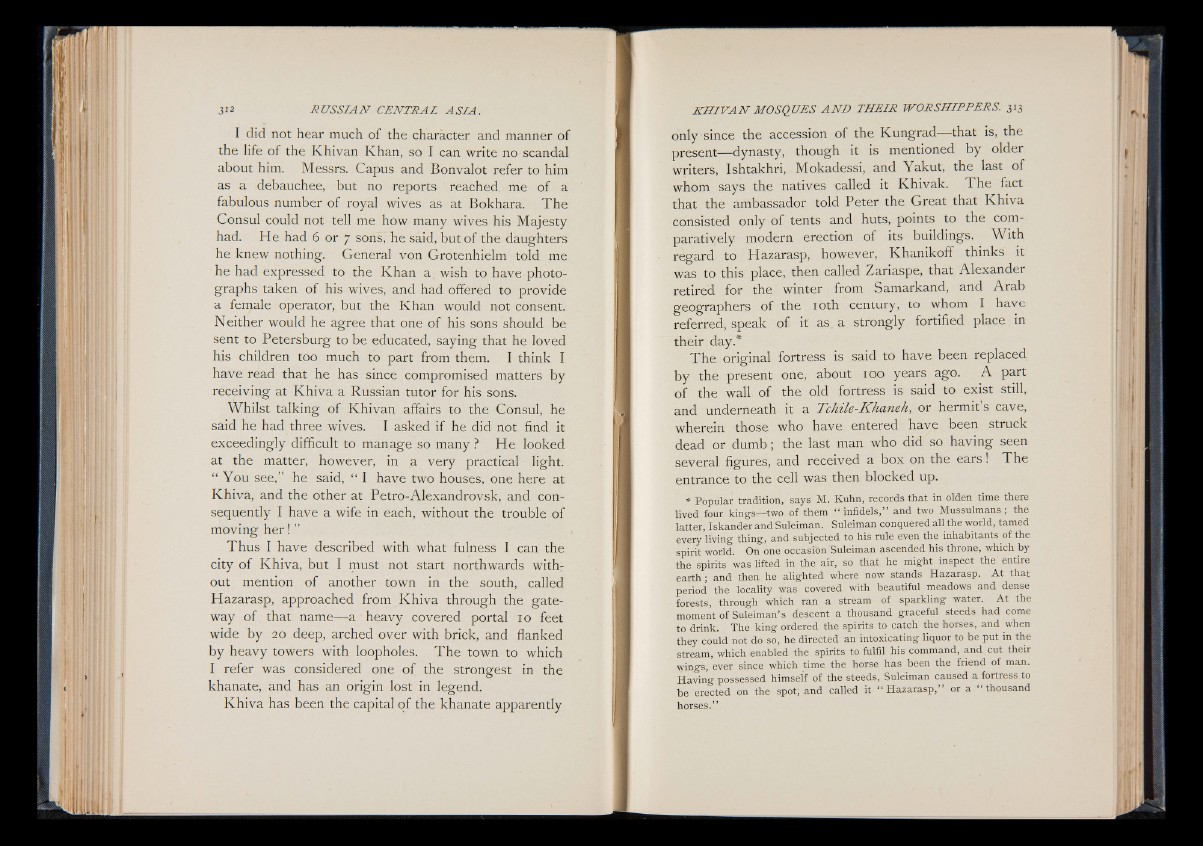
I did not hear much of the character and manner of
the life of the Khivan Khan, so I can write no scandal
about him. Messrs. Capus and Bonvalot refer to him
as a debauchee, but no reports reached me of a
fabulous number of royal wives as at Bokhara. The
Consul could not tell me how many wives his Majesty
had. He had 6 or 7 sonsi he said, but of the daughters
he knew nothing. General von Grotenhielm told me
he had expressed to the Khan a, wish to have photographs
taken of his wives, and had offered to provide
a female operator, but the Khan would not consent.
Neither would he agree that one of his sons should be
sent to Petersburg to be educated, saying that he loved
his children too much to part from them. I think I
have read that he has since compromised matters by
receiving at Khiva a Russian tutor for his sons.
Whilst talking of Khivan affairs to the Consul, he
said he had three wives. I asked if he did not find it
exceedingly difficult to manage so many ? He looked
at the matter, however, in a very practical light.
“ You see,” he said, “ I have two houses, one here at
Khiva, and the other at Petro-Alexandrovsk, and consequently
I have a wife in each, without the trouble of
moving h e r ! ”
Thus I have described with what fulness I can the
city of Khiva, but I must not start northwards withr
out mention of another town in the south, called
Hazarasp, approached from Khiva through the gateway
of that name— a heavy covered portal 10 feet
wide by 20 deep, arched over with brick, and flanked
by heavy towers with loopholes. T he town to which
I refer was considered one o f the strongest in the
khanate, and has an origin lost in legend.
Khiva has been the capital of the khanate apparently
only since the accession of the Kungrad— that is, the
present— dynasty, though it is mentioned by older
writers, Ishtakhri, Mokadessi, and Yakut, the last of
whom says the natives called it Khivak. T he fact
that the ambassador told Peter the Great that Khiva
consisted only of tents and huts, points to the comparatively
modern erection of its buildings. With
regard to Hazarasp, however, Khanikoff thinks it
was to this place, then called Zariaspe, that Alexander
retired for the winter from Samarkand, and Arab
geographers of the 10th century, to whom I have
referred, speak of it as. a strongly fortified place in
their day.*
The original fortress is said to have been replaced
by the present one, about 100 years ago. A part
of the wall of the old fortress is said to exist still,
and underneath it a Tchile-Khaneh, or hermit’s cave,
wherein those who have entered have been struck
dead or dumb; the last man who did so having seen
several figures, and received a box on the e a r s ! The
entrance to the cell was then blocked up.
* Popular tradition, says id. Kuhn, records that in olden time there
lived four kings-—two of them “ infidels,” and two Mussulmans; the
latter, Iskander and Suleiman. Suleiman conquered all the world, tamed
every living thing, and subjected to his rule even the inhabitants of the
spirit world. On one occasibn "Suleiman ascended his throne, which by
the spirits was lifted in the air, so that he might inspect the' entire
earth; and then he alighted where now stands Hazarasp. At that
period the locality was covered with beautiful meadows and dense
forests, through which ran a stream of sparkling water. At the
moment of Suleiman’s descent a thousand graceful steeds had come
to drink. The king ordered the spirits to catch the horses, and when
they could not do so, he directed an intoxicating liquor to be put in the
stream, which enabled the spirits to fulfil his command, and cut their
wings, ever since which time the horse has been the friend of man.
Having possessed himself of the steeds, Suleiman caused a fortress.to
be erected on the spot; and called it “ Hazarasp,” or a “ thousand
horses.”